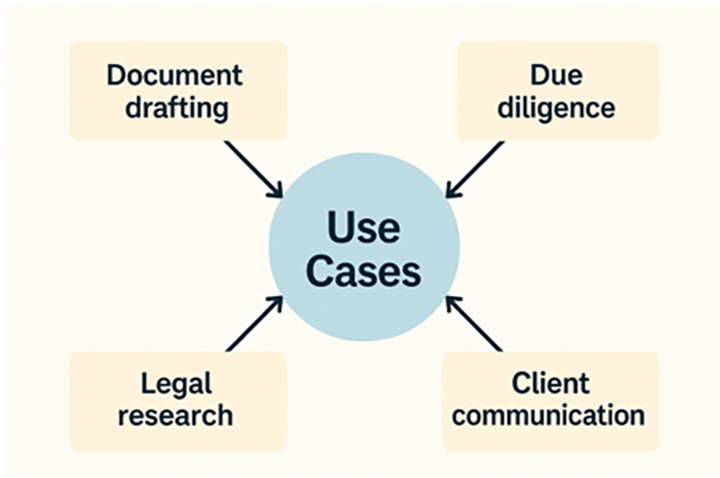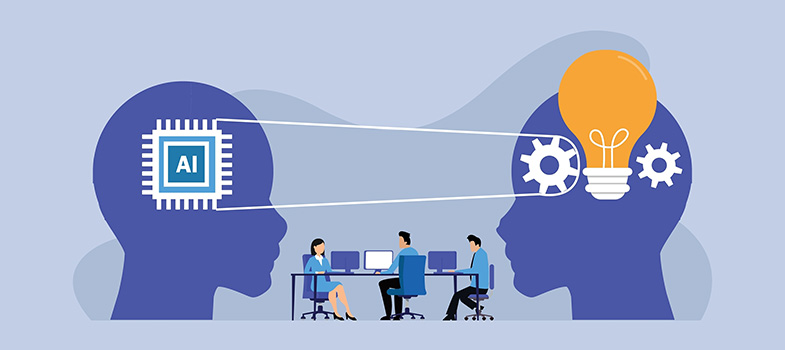Legal use cases

Document drafting
AI can assist with drafting legal documents using predefined templates and input data. With the correct prompts, AI can draft legal briefs, contracts, waivers and memos as a starting point, which a human is then able to review and amend. This function streamlines the drafting process and also helps to develop legal drafting skills alongside consolidating understanding by reviewing and checking the information provided by AI.
Most importantly, these documents can only be created with human input and guidance, otherwise the risk of incorrect information is significant. AI may include prohibited provisions or incorrect contract clauses. For example, AI may create a contract which has a clause to exclude liability for death or personal injury as a result of negligence – which is prohibited under the Unfair Contract Terms Act 1977.
Due diligence
AI can automate the review of large volumes of documents, identifying potential risks, issues or any information which stands out. AI tools are also able to generate due diligence reports, summarising findings and highlighting the key points.
In the ‘Further reading’ section later in this course, there is a link to a research paper, The Rag Report: Large Language Models in Legal Due Diligence (Addleshaw Goddard, 2024), which explores the development of an inhouse LLM for mergers and acquisition transaction due diligence and commercial contract review.
GenAI can make mistakes and therefore the onus is still on the human providing the prompt to ensure that the summary is conducted effectively.
Legal research
Listen to this audio clip in which Henry Sturm talks about legal research tools.

Transcript
GenAI has the potential to revolutionise legal research by automating the analysis of vast amounts of case law and legal precedents. This technology enables users to quickly find relevant information, and save time by summarising lengthy legal documents, and making complex cases more accessible and easier to understand. However, it is important to remember that LLMs can hallucinate and make mistakes. Damien Charlotin has created a website with a database [Tip: hold Ctrl and click a link to open it in a new tab. (Hide tip)] that is seeking to track the use of AI hallucinated cases in legal decisions. If you are using LLMs you are responsible for checking the output.
Click on each box below to read more.
Client communication
AI powered chatbots can play a vital role in client communication by answering common legal questions and providing initial guidance. They can provide instant responses and are available 24/7 so can offer immediate assistance to clients.
Some law firms have integrated them into their website to explain legal processes and firm services to clients in accessible language, automating responses to FAQs about legal timelines, document requirements, and case updates. They can provide consistent, branded responses while escalating complex matters to human lawyers.
Here are some examples of tools.
Harvey AI
Harvey AI is an advanced artificial intelligence platform specifically designed to enhance the efficiency and accuracy of legal professionals. By leveraging the power of machine learning and natural language processing, Harvey AI assists with a wide range of legal tasks, including legal research, contract analysis, document drafting and regulatory compliance. By automating these time-consuming processes, Harvey AI enables lawyers to focus on higher-value activities such as strategy development and client interactions.
Harvey AI is an advanced AI-driven legal assistant that utilises LLM's to assist lawyers, law firms and corporate legal departments. It provides powerful tools for legal professionals to draft documents, analyse contracts, conduct legal research and generate insights from case laws quickly and efficiently. Developed by a team of AI researchers and legal experts, Harvey AI integrates cutting-edge technologies like OpenAI’s GPT-based models to understand complex legal queries and provide relevant, reliable and actionable responses. The AI aims to enhance decision-making, reduce manual workloads and improve accuracy in legal documentation.
Harvey AI operates through advanced machine learning algorithms and natural language processing capabilities. It processes vast amounts of legal texts, case laws, regulations and statutory materials. By understanding and interpreting legal queries in plain language, Harvey AI allows lawyers to interact with it naturally. Using deep learning Harvey AI refines its accuracy by learning from past cases, user interactions and historical legal data. It can quickly scan through legal databases to provide relevant case law and citations, assist in drafting contracts and legal agreements, and review legal documentation for inconsistencies or potential risks. Additionally, Harvey AI helps firms stay compliant with legal regulations by analysing policies and detecting any areas of non-compliance.
Several prominent UK law firms have adopted Harvey AI. These firms utilise Harvey AI to perform tasks, such as due diligence, litigation support, and compliance analysis, significantly improving productivity and reducing manual workloads.
AI Matter Assistant (Archie)
Archie automates routine legal tasks. It has been designed to support law firms with summarising documents, drafting letters or emails, answering matter-specific questions and conflict checking and risk analysis. It has been created by a US company as part of its document management system.
LegalMation
LegalMation is a US company that brings together lawyers and technologists to design solutions for law firms. It has a series of tools that use AI to support litigation and dispute resolution and is being used by law firms, corporate legal departments and insurance companies. To learn more about this tool watch this short video.
Automated contract review
There are a proliferation of AI contract review tools like Kira Systems and Luminance that can analyse contracts to identify key clauses, risks and compliance issues. These tools use machine learning algorithms to quickly process large volumes of documents, saving time and reducing human error. Kira Systems can extract and analyse clauses from contracts, providing insights into potential risks and obligations. Consequently, these tools result in increased efficiency, accuracy, and consistency in document review. Other examples include Juro, Spellbook and Lexion, and this article suggests the nine best AI contract review tools.
Predictive analytics
AI tools like Lex Machina and Premonition can analyse historical case data to predict litigation outcomes. These tools use advanced algorithms to identify patterns and trends, helping lawyers make informed decisions. Lex Machina provides data-driven insights into case outcomes, judge behaviour, and opposing counsel strategies – improving decision-making, strategic planning, and risk assessment.
AI in judicial decision-making
The University of Ulster is working on research into the role of AI in judicial decision-making and the research will develop ethical guidelines and policy recommendations about the adoption of AI across the courts system.
For organisations considering the adoption of GenAI tools, the final sections of this course explore a practical framework for AI adoption, along with processes to support effective change management.
6 GenAI use cases in the legal sector



